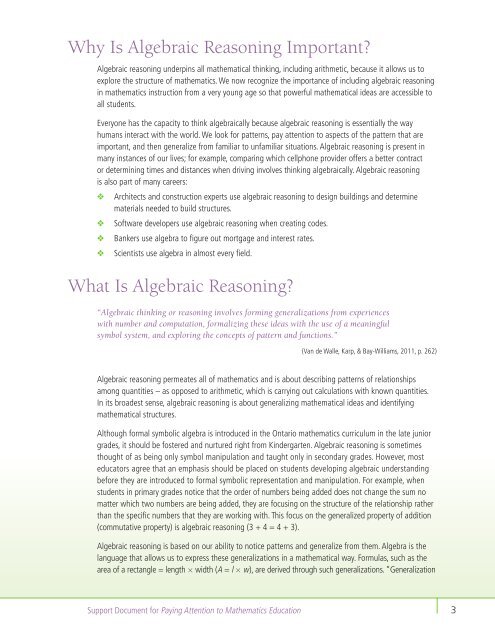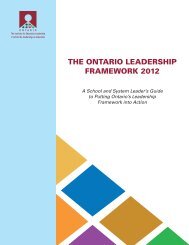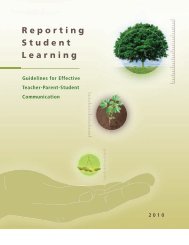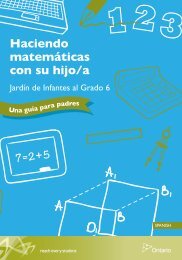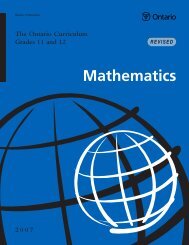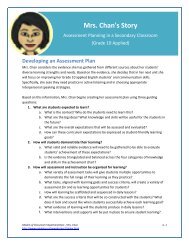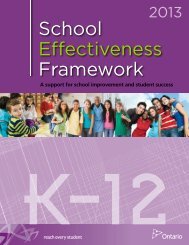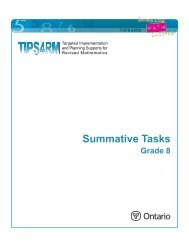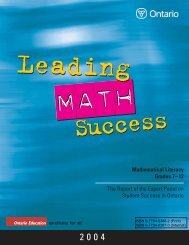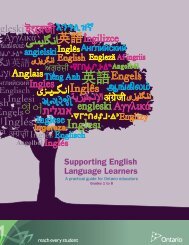Paying Attention to Algebraic Reasoning, K to 12 - EduGains
Paying Attention to Algebraic Reasoning, K to 12 - EduGains
Paying Attention to Algebraic Reasoning, K to 12 - EduGains
Create successful ePaper yourself
Turn your PDF publications into a flip-book with our unique Google optimized e-Paper software.
Why Is <strong>Algebraic</strong> <strong>Reasoning</strong> Important?<strong>Algebraic</strong> reasoning underpins all mathematical thinking, including arithmetic, because it allows us <strong>to</strong>explore the structure of mathematics. We now recognize the importance of including algebraic reasoningin mathematics instruction from a very young age so that powerful mathematical ideas are accessible <strong>to</strong>all students.Everyone has the capacity <strong>to</strong> think algebraically because algebraic reasoning is essentially the wayhumans interact with the world. We look for patterns, pay attention <strong>to</strong> aspects of the pattern that areimportant, and then generalize from familiar <strong>to</strong> unfamiliar situations. <strong>Algebraic</strong> reasoning is present inmany instances of our lives; for example, comparing which cellphone provider offers a better contrac<strong>to</strong>r determining times and distances when driving involves thinking algebraically. <strong>Algebraic</strong> reasoningis also part of many careers:❖❖❖❖❖❖❖❖Architects and construction experts use algebraic reasoning <strong>to</strong> design buildings and determinematerials needed <strong>to</strong> build structures.Software developers use algebraic reasoning when creating codes.Bankers use algebra <strong>to</strong> figure out mortgage and interest rates.Scientists use algebra in almost every field.What Is <strong>Algebraic</strong> <strong>Reasoning</strong>?“<strong>Algebraic</strong> thinking or reasoning involves forming generalizations from experienceswith number and computation, formalizing these ideas with the use of a meaningfulsymbol system, and exploring the concepts of pattern and functions.”(Van de Walle, Karp, & Bay-Williams, 2011, p. 262)<strong>Algebraic</strong> reasoning permeates all of mathematics and is about describing patterns of relationshipsamong quantities – as opposed <strong>to</strong> arithmetic, which is carrying out calculations with known quantities.In its broadest sense, algebraic reasoning is about generalizing mathematical ideas and identifyingmathematical structures.Although formal symbolic algebra is introduced in the Ontario mathematics curriculum in the late juniorgrades, it should be fostered and nurtured right from Kindergarten. <strong>Algebraic</strong> reasoning is sometimesthought of as being only symbol manipulation and taught only in secondary grades. However, mosteduca<strong>to</strong>rs agree that an emphasis should be placed on students developing algebraic understandingbefore they are introduced <strong>to</strong> formal symbolic representation and manipulation. For example, whenstudents in primary grades notice that the order of numbers being added does not change the sum nomatter which two numbers are being added, they are focusing on the structure of the relationship ratherthan the specific numbers that they are working with. This focus on the generalized property of addition(commutative property) is algebraic reasoning (3 + 4 = 4 + 3).<strong>Algebraic</strong> reasoning is based on our ability <strong>to</strong> notice patterns and generalize from them. Algebra is thelanguage that allows us <strong>to</strong> express these generalizations in a mathematical way. Formulas, such as thearea of a rectangle = length 3 width (A = l 3 w), are derived through such generalizations. “GeneralizationSupport Document for <strong>Paying</strong> <strong>Attention</strong> <strong>to</strong> Mathematics Education3


